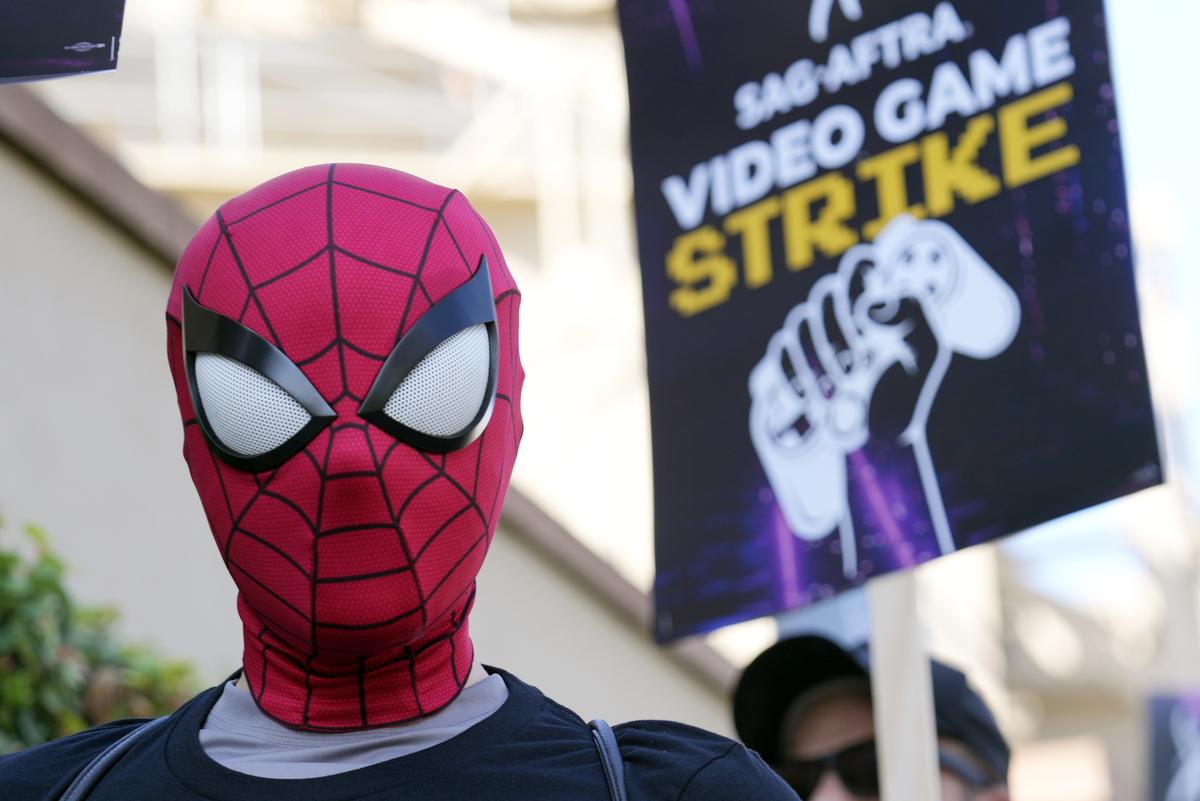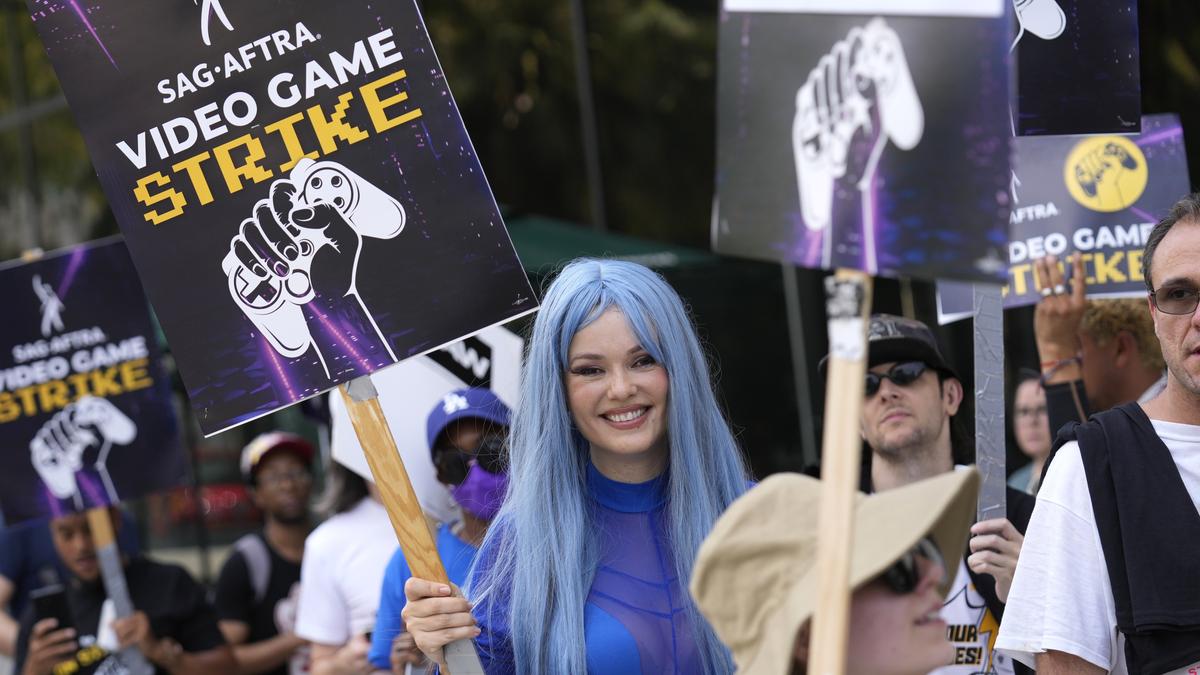Natasha Blasick attends the kick-off picket line for the SAG-AFTRA video game strike at Warner Bros. Games Headquarters on Thursday, Aug. 1, 2024, in Burbank, California. | Photo credit: Chris Pizzello
More than 300 video game artists and Hollywood actors picketed outside the Warner Bros. studio building on Thursday, protesting top gaming companies’ reluctance to equally protect union voice actors and motion capture workers against the unregulated use of artificial intelligence.
Standing before the crowd, Duncan Crabtree-Ireland, national executive director of the Screen Actors Guild-American Federation of Television and Radio Artists, said AI has become the most challenging issue in many of the union’s negotiations.
“We’ve struck deals with studios and streamers. We’ve struck strike-free deals with major record labels and countless other employers that provide informed consent and fair compensation for our members,” he added. The Associated Press“And yet, for some reason, video game companies refuse to do this and that leads to their ruin.”
The protests are the first major labor action since SAG-AFTRA games workers voted to strike last week. The work stoppage comes after more than 18 months of negotiations with the gaming giants, which include divisions of Activision, Warner Bros. and The Walt Disney Co., stalled over safety around the use of AI on a new interactive media agreement. Warner Bros. Games is the publisher behind games such as “Hogwarts Legacy” and “Suicide Squad: Kill the Justice League.”

A worker wearing a mask walks during a SAG-AFTRA video game strike kick-off picket outside Warner Bros Games in Burbank, California, USA, on August 1, 2024. | Photo credit: Mario Anzuoni
The crowd chanted, “Sign up, game down, LA is a union town,” on Thursday morning, many of them holding signs with video game controllers clutched in fists. One man, wearing a skull mask reminiscent of a “Call of Duty” character called Ghost, waved a poster that read, “Don’t make us ghosts for AI. It’s your duty to pay the actors.” The first-person shooter game is published by Activision.
Members of the International Alliance of Theatrical Stage Employees and the Writers Guild of America also joined the protest in a show of solidarity.
Union leaders have called AI an existential threat to performers. They say game voice actors and motion capture artists can be imitated by AI and used without consent and proper compensation. The union says the unregulated use of AI poses an “equal or even greater threat” to performers in the video game industry than film and television because the ability to create cheap and easily reliable digital replicas of performers’ voices is widely available.
Concerns over AI fueled a strike by the Film and Television Union last year, which lasted four months.
At the picket line, Constantine Anthony said most people want humans to be their storytellers — not AI. “The algorithms that we see in our most advanced video games have been around for decades. It’s just getting more advanced to recreate, to create similarities — that’s what they’re really trying to do so they don’t have to use us anymore,” said Anthony, who is a member of the Burbank City Council and SAG-AFTRA. “That’s why we’re here today: to ask that they just pay their storytellers.”
Motion capture artist Seth Allyn Austin said his union involvement has grown significantly as a result of the negotiations that have been ongoing over the past year and a half.
“To come here and then have the support from my fellow artists, knowing that you’re all in this fight together, it’s like they’re all a monument standing behind me. It’s amazing,” said Austin, who has worked on games like “Horizon Forbidden West” and “God of War Ragnarok.”
Audrey Cooling, a spokesperson for the video game producers, said the companies have offered work on AI safety as well as “significant pay increases for SAG-AFTRA represented performers in video games.”

SAG-AFTRA member and video game actor Zachary Luna attends the kick-off picket line for the SAG-AFTRA video game strike at Warner Bros. Games Headquarters, Thursday, Aug. 1, 2024, in Burbank, Calif. | Photo credit: Chris Pizzello
“We’ve worked hard to come up with a proposal with fair terms that protect the rights of the performers while also ensuring we can continue to use the most advanced technology to create a great gaming experience for fans,” Cooling said. “We’ve proposed terms that provide consent and fair compensation for anyone employed under (the contract) if an AI replica or digital replica of their performance is used in the games.”
SAG-AFTRA’s negotiating committee argued that the studios’ definition of “performer” was crucial to understanding the issue of who would be protected.
“The industry has told us quite clearly that they don’t necessarily consider everyone who is performing in motion to be a performer covered under the collective bargaining agreement,” Ray Rodriguez, SAG-AFTRA’s chief contracting officer, said at a press conference last week. He added that some physical performances are being treated as “data.”
The union was negotiating with an industry bargaining group that included signatory video game companies. Those companies are Activision Productions Inc., Blindlight LLC, Disney Character Voices Inc., Electronic Arts Productions Inc., Formosa Interactive LLC, Insomniac Games Inc., Llama Productions LLC, Take 2 Productions Inc., Voiceworks Productions Inc. and WB Games Inc.
According to game market forecaster Newzoo, the global video game industry will generate revenue of approximately $184 billion in 2023, and revenue is projected to reach $207 billion in 2026.
“We are at the negotiating table because we want to include SAG-AFTRA-represented actors in our productions, and we will continue to work to resolve the last remaining issue in these negotiations,” Cooling said. “Our goal is to reach an agreement with the union that will end this strike.”
